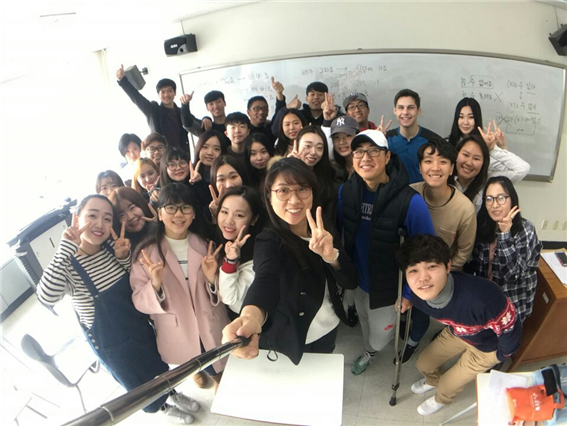Hallyu, or the “Korean wave” of popular culture, has become a global phenomenon, spreading beyond Asia into Europe, Africa and the Americas. International fans who were first initiated into this pop culture have since grown interested in food and other aspects of Korea. In particular, there has been a marked increase in the number of people studying the Korean language.

“I want to be a bridge between Korea and Vietnam.”
Nguyen Thi Thuy Lan, a Korean major at the University of Foreign Languages, Hue Universityin Vietnam, fell in love with Korean pop culture in high school. Wanting to learn more about Korea, she recently enrolled in a language course at Jeju National University. Her dream is to become a Korean language teacher and serve as a bridge between the two countries.
“I was drawn to Korean because it sounded so beautiful when I heard it in TV dramas,”said Nguyen. “As there are a lot of Korean companies doing business in Vietnam, I also thought that learning Korean could improve my career prospects.”
Learning the language has deepened her understanding of Korean culture. For example, she has learned some basic Korean table manners: to eat rice with a spoon rather than chopsticks, to never stick utensils in the rice and to put them back in their place on the table when the meal is finished. “It’s more complicated than the dining etiquette in Vietnam, but understanding the culture helps when learning the language,” she said.
Nguyen says there’s a burgeoning interest in the Korean language among the Vietnamese.Many vietnamese students listen to K-pop, watch Korean TV shows, and find Korean food and entertainment attractive, and that’s why Korean has been selected as a regular subject in their primary and secondary schools.
Now in her fourth year of studying Korean, Nguyen picks as her favorite Korean word “uri,” meaning “us” or “our.” At first, she didn’t understand why Koreans used it in phrases like “uri husband” or “uri wife,” but after learning that the word connoted a sense of community, she came to like it.

“I became hooked on Hallyu while studying Korean.”
Henry Rawcliffe, a law major at the University of Sheffield in the UK, is engrossed in learningKorean these days. He’s a student in “Learn! Korean with BTS,” an online course that teachesKorean expressions frequently used by members of the boy band.
Rawcliffe was inspired to learn Korean by the mass media’s coverage of Korean culture. “The best way to understand a culture is to learn the country’s language, isn’t it?” he said, laughing. Half a year into the course, he has mastered basic Korean and hopes to progress to the level where he can study it on his own. “I haven’t been to Korea, but would like to go one day and visit many wonderful places, like Changdeok Palace,” he said.
Rawcliffe became interested in Korean pop culture while learning the language, whereasthe opposite is true for most global hallyu fans. His fellow students in the online course radiated love for Korean pop culture, listening to songs by BTS all day long, and soon had him hooked. The more he listened to K-pop, the more he wished he could understand the lyrics. An interesting aspect of Korean he has discovered is “respect.” At a time when racism and hate are rampant, he feels that “other countries would do well to learn from Korea’s culture of respect.”
Some of his favorite Korean words are mimetic, like “eonggeum eonggeum” (to describecrawling) and “kkangchong kkangchong” (to describe hopping), for which no exact English equivalent exists. He thinks they sound cute. Although Rawcliffe says Hangeul is simple, he finds the grammar difficult. “I plan to continue learning the language through TV dramas and songs,” he added.
A Teacher’s View

“A solid grasp of the basics is important.”
Kim Mi-ok, head professor at Yong In University’s Korean Language Institute, has witnessed the impact of hallyu first-hand while teaching foreign students over the past 12 years. The bulkof her current students are ardent fans of K-pop idol groups. “Our university is particularly famous for its taekwondo program, so in the past, most of our foreign students had developedan interest in Korean through taekwondo,” she said. “However, I’ve seen a significant shift in recent years, with the majority of foreign exchange students being fans of acts like Super Junior, TVXQ and BTS.”
Teaching methods have also changed with the times as most of the students now belongto the MZ generation (millennials and Gen Z). With classes being held online due to COVID-19, it has also been necessary to find strategies to keep the students focused. “During normal, in-person classes, it’s easier to make adjustments depending on the students’ response and usetactics to hold their attention. But I’ve found that in virtual classes, incorporating games is the best way to keep the students engaged. At times, I feel like a recreation instructor,” said Kim.
Different attitudes to language learning also affect methods of instruction. Whereas Koreans focus on correct use of grammar and vocabulary, most foreigners tend not to place so much importance on writing once they’re able to speak the language. “A lot of foreign students think it’s unfair that teachers put strong emphasis on writing and base evaluations on grammar and vocabulary,” said Kim. Compared to Korean students, Kim says it also takes time for foreign students to accept the concept of “homework.”
Kim agrees Hangeul is fairly easy to learn. Although the characters may initially look strange, it doesn’t take long for foreign students to master them. That’s not the case with pronunciation. Although students don’t have great difficulty pronouncing the individual letters, they have a hard time linking sounds, using aspirated consonants, and managing silent ㅎ and ㄴ insertions.
For most of the foreign students at the institute, level three of the program is the most difficult. Levels one and two are for beginners, so it’s possible to pass with some self-study. Particularly for K-pop fans, the beginner levels are a breeze. However, grammar and vocabulary become quite challenging from level three. Students find that even the meanings of familiar words aren’t always easy to recall when in the context of a sentence. But once theyget through this stage and begin level four, they can have fun with the language.
“The basics are the most important thing in language learning, which is why students need to fully master each level,” said Kim. “Occasionally, I come across students whose sole interest is in advancing to the next level, but without a solid grasp of the previous levels, they will face immense difficulty even if they manage to move onto the next stage.”
Ultimately, one can say, it all comes down to the basics. Students from all parts of the world who studied under Kim are now realizing their dreams. One student opened a taekwondo studio back home and another became an international referee. And she distinctly remembersone Chinese student who now teaches Korean in Thailand.
Kang Young-woon Reporter, Maeil Business Newspaper